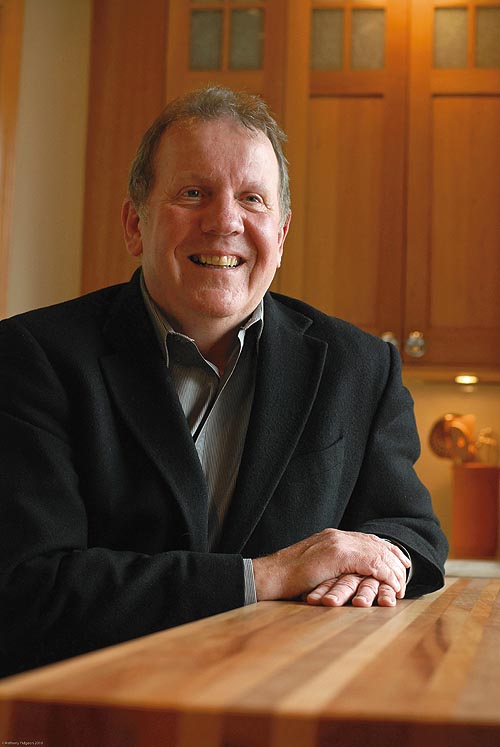 Recycling is so passé. All of the 100 Best Green Companies to Work For in Oregon are doing it — making sure paper, plastic, metal and any other recyclable material ends up in the blue bin and not the trash can. Many employees are even willing to reprimand their co-workers over matters of waste disposal, and when necessary, Dumpster dive.
Recycling is so passé. All of the 100 Best Green Companies to Work For in Oregon are doing it — making sure paper, plastic, metal and any other recyclable material ends up in the blue bin and not the trash can. Many employees are even willing to reprimand their co-workers over matters of waste disposal, and when necessary, Dumpster dive.
The 100 Best Green Companies to Work For are doing whatever it takes to
improve workplace sustainability: cutting waste, buying bikes, even Dumpster diving.
STORY BY AMANDA WALDROUPE // PHOTOS BY ANTHONY PIDGEON
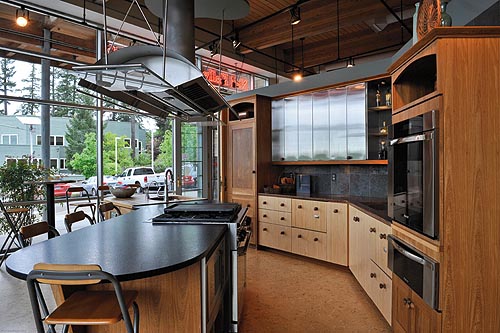 | ||||||||
 | ||||||||
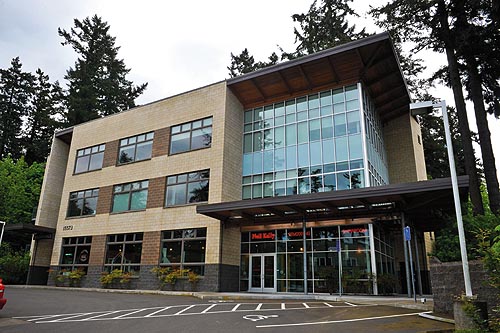 | ||||||||
Neil Kelly CEO Tom Kelly has been a longtime leader in Oregon’s green building sector. | ||||||||
|
Recycling is so passé. All of the 100 Best Green Companies to Work For in Oregon are doing it — making sure paper, plastic, metal and any other recyclable material ends up in the blue bin and not the trash can. Many employees are even willing to reprimand their co-workers over matters of waste disposal, and when necessary, Dumpster dive.
Suzie Atkin is one of those green knights. Atkin, a designer for Neil Kelly, which ranked No. 9 on this year’s list, readily admits to reaching into the compost bin to grab something recyclable. It comes down to awareness, she says. Atkin would know. She’s a member of Neil Kelly’s “green team,” a group of employees charged with making their workplace more sustainable. Two things stuck out to Atkin about making that a reality: the low-hanging fruit and getting people to follow through.
“It’s been a constant education and learning process for everyone,” she says.
Those low-hanging fruits have been picked at Neil Kelly, along with some high-hanging morsels as well. Half the lights are permanently off throughout company headquarters. Low-flow toilets conserve energy and water. Outside, a Zipcar sits in the parking lot. In the back, an old biodiesel tank used to fuel company cars harkens back to earlier green efforts.
Other winners from our 100 Best are switching to green cleaners, compact fluorescent bulbs, and programmable thermostats; they are investing in solar panels, upgrading their buildings to meet LEED standards, cutting down their waste streams, buying bikes for loyal commuters, giving allowances to employees who buy hybrid cars, and thinking of new ways to overcome challenges presented by equipment, costs and other constraints.
Over 26,000 employees from 503 Oregon companies and nonprofits completed the surveys on which the 2010 rankings are based, rating their satisfaction with and the importance of their company’s sustainable practices. Companies also provided a report detailing their green efforts.
Oregon’s entire business community, in terms of geography and industry sector, is represented. Newbie businesses energetically committed to green ideals join businesses with long traditions of incorporating sustainability in the workplace.
And they are going beyond the ordinary and expected, even though finding fresh ways to be sustainable can be just as difficult as cutting costs and finding a profit in this economy. To be a sustainable business in Oregon means thinking creatively, investing in your values, and above all, listening to the employees. For the most part, that’s where the ideas come from.
Central Point-based cheese making company Rogue Creamery (No. 22) used to generate two garbage bags full of wax every day. The wax is used to store aging cheese, and it can’t be cleaned or used again. Kristine DeMaria, a quality assurance manager at Rogue Creamery, spearheads the company’s sustainability efforts. She says finding a way to reuse the wax was an obvious goal. DeMaria and her colleagues started by looking for a candle maker. They never found one, but they did find a manufacturing company who has taken the wax and put it to use. That cut their waste stream by 30%.
Click through for page two!
Want to make a comment? Please go to the final page.
 |
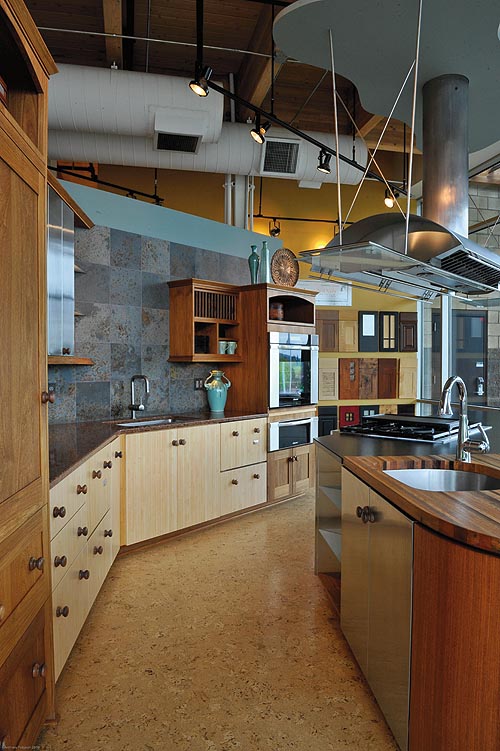 |
Neil Kelly’s “natural kitchen display” at its Lake Oswego showroom features reclaimed African hardwoods, motion sensor lighting and Forest Stewardship Council-certified bamboo. |
Plenty of other companies are tackling similarly vexing problems caused by outdated equipment, inefficent design and wasteful manufacturing processes.
Take beer breweries, two of which — Standing Stone Brewing Company (No. 3) and Full Sail Brewery (No. 46) — made the 100 Best Green list. Breweries use tremendous amounts of energy to prepare beer for fermentation, a process involving heating water to 190 degrees Fahrenheit. Standing Stone developed a heat recovery system that replaced two wasteful practices with one innovative solution. The system captures waste heat from its refrigeration devices into metal coils that heat the water used for preparing beer. That eliminated the need to use hot water heaters. Alex Amarotico, Standing Stone’s founder, says the upgrade cut yearly natural gas costs by $10,000.
It isn’t surprising in a state with thousands of miles of bike lanes that one of the most common sustainable practices used by Oregon businesses is related to bikes. Some businesses are organizing commuting challenges; others are taking it a step further by buying bicycles for employees who commit to commuting a certain number of days per year.
When Slocum Orthopedics (No. 81) was designing its new office, CEO John Bauman insisted on a design incorporating showers and lockers for employees who already commute by bicycle and others who might be encouraged to do so because of the new amenities. Standing Stone and Rogue Creamery buy bikes for employees who agree to ride them 45 days of the year. Amarotico says 22 of his 53 employees take part in the program, and Standing Stone has paid $450 per bike, or $9,900. Rogue Creamery has spent $350 per bike for 20 of its 35 employees, or $7,000.
This is money these small businesses will never see again (except for partial tax credits). But it’s worth it, they say. “It all plays into business success in the end,” says DeMaria, by generating good will among employees and attracting customers who patronize sustainable businesses.
Paul Gilles, vice president of operations for Portland Roasting (No. 55), also sees green expenses as investments. Portland Roasting has its coffee delivered to stores one day a week by B-Line, a Portland-based bike delivery service. It takes one delivery truck off the road, driving up costs by 20%. “But it’s more in line with what our customers want,” he says.
A spirit of collaboration among other businesses and agencies, like the collaboration between Portland Roasting and B-Line, has driven green reforms at many 100 Best Green businesses.
The Northwest Coalition fo Alternatives to Pesticides (No. 29) works with Eugene Water and Electric Board to buy renewable energy and save money through conservation.
Portland YouthBuilders (No. 79), a nonprofit providing work and education opportunities for at-risk teens, has had the Energy Trust of Oregon and the Oregon Green Schools Association conduct audits on energy efficiency over the last four months. As a result, a green team composed of students and staff has taken out half the lights, put recycling bins in every classroom and installed sensors that turn lights off when no one is in the room. They’ve also created a full-time sustainability manager position. That manager, Sid Klein, says many of Portland YouthBuilders’ efforts would not have been possible without reaching out to partners. “It’s opened us up,” he says.
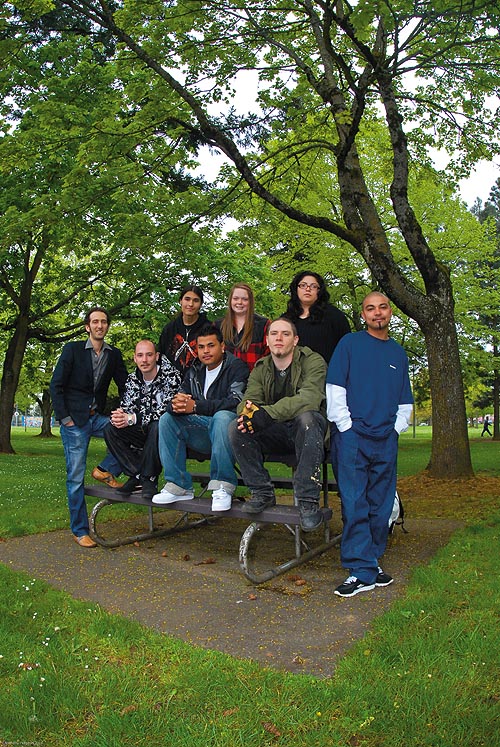 |
Sid Klein (standing to the far left) is sustainability manager for Portland YouthBuilders, joined by YouthBuilder students. Back row, left to right: Anthony Espinosa, Kasey Schuermyer, and Luci Barbosa. Front row, left to right: Filip Joska, Herman Kessler, Darren Larsen and Neil Quintero. |
Green teams and sustainability managers are becoming an increasingly integral part of workplaces. Like Portland YouthBuilders, Neil Kelly, and other companies on the 100 Best Green list, Slocum Orthopedics recently added a green team made up of staff not in upper management. Bauman says the group had an important voice while the company’s new LEED-certified building was being designed.
One recommendation that group came up with was eliminating the use of fertilizers and pesticides in its lawn and outdoor spaces to stop chemicals from draining into the Willamette River. Weeds are now pulled out by hand, adding 10% to 15% more in Slocum’s landscaping costs.
In addition to costs, the quest for a more sustainable workplace can bring challenges and obstacles. The Portland law firm Schwabe, Williamson and Wyatt (No. 95) takes up six floors in a 30-floor building it does not own, meaning it cannot dictate energy use, and must work with building management and other tenants to find common ground.
A daunting price tag prevented the Northwest Coalition for Alternatives to Pesticides from installing a solar panel on the roof. But Leval and her team didn’t give up on a green upgrade. They just changed their approach.
“It wouldn’t be cost effective for us to get a solar panel,” says Leval. “We can do a lot by changing our lighting and putting insulated curtains in. There are things people can discover if they just look that can save them money and help the environment.”
Things such as Portland Roasting’s plan to install 40 kilowatts of solar panels within the year and possibly eco-roofs as well. Or Standing Stone’s idea to heat the restaurant with waste vegetable oil.
Many businesses talk about adding sustainability managers, eco-roofs, solar panels, and retrofitting HVAC systems. Tom Kelly, Neil Kelly’s CEO, says he would like to achieve net-zero energy use at the company’s headquarters by his retirement, generating as much energy as is used. That one won’t be easy. “Money is always an obstacle,” Kelly says.
But the Oregon businesses on the 100 Best Green Companies list are known for their creativity and spunk. They know all too well that the recession demands fresh business ideas and strategies just as the planet demands saving.






